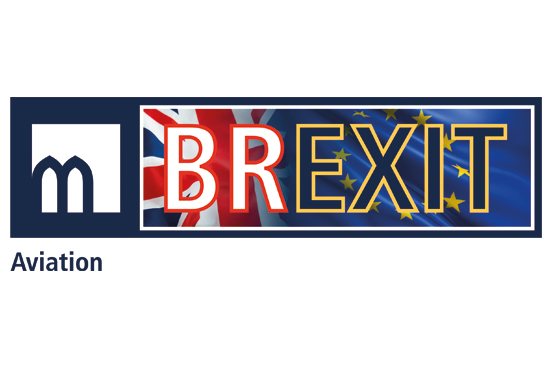Author
Willie Walsh, CEO of IAG (owner of British Airways, among others) was asked on the BBC R4 Today programme on 28 February, whether BA had been hit by costs from Brexit. He said: “There are issues from Brexit that we need to address, but these are issues that the industry at large – and certainly IAG – can address without too much concern.” Mr Walsh added: “We remain confident that there will be a comprehensive air transport agreement between the EU and the UK. If you go back a year, people were saying ‘will we be able to fly at all?’ I dismissed all of that and I think I’ve been proven correct.”
So, where are we in the legal process underpinning any such ‘comprehensive air transport agreement’? We have summarised the position below and provided links to (some of) the relevant information. With due deference to Mr Walsh, whilst we agree that the risk of not being able to fly at all is increasingly small, there is clearly some way to go before a ‘comprehensive’ air transport agreement is in place, deal or no deal.
The importance of this issue across many sectors of the economy was recognised in a letter sent by the Secretary of State for Transport to the aviation industry, following adverse publicity in The Sunday Times on 16 December 2018. The Government had already spelt out the implications in an earlier note on Flights to and from the UK if there’s no Brexit deal.
Consistent with Chris Grayling’s statement, the European Commission has put forward two proposed regulations for the withdrawal of the UK from the EU. These cover:
The Explanatory Memorandum at the beginning of the first set of draft regulations (‘Context of the Proposal’) sets out quite clearly, albeit from the perspective of the ‘remaining 27’ states (the EU-27), the potential impact of a no-deal Brexit on air services between the UK and the EU-27. Further, given that 19.3% of all intra-EU air transport (i.e. not only routes across the Channel and the Irish Sea) is via UK-licensed carriers, there would clearly be implications for many member states, if the UK were cut adrift. Against this backdrop, the draft regulation to ensure ‘basic air connectivity’ follows up on the Commission’s ‘Contingency Action Plan’ of November 2018. In its own words, the regulation is intended to ensure that air carriers from the United Kingdom are allowed to:
- fly over the territory of the European Union
- make technical stops (e.g. refuelling without embarkation/disembarkation of passengers)
- land in the EU and fly back to the United Kingdom.
These ‘bare bones’ measures are for a temporary period (12 months) and subject to the condition that the United Kingdom applies equivalent measures to air carriers from the EU-27. They do not include a right to land in the EU and fly on to a destination outside the EU. They do not clarify the position on code sharing arrangements; do not permit flights by UK carriers between two airports in the EU-27 and, broadly, they freeze the number of flights at 2018 levels. The Regulation on basic air connectivity is currently subject to a feedback procedure within the EU, which is due to end on 6 March, 2019.
The second, proposed EU Regulation is more technical in nature. Again, the ‘Context of the Proposal’ section sets out the background and potential implications of a no-deal Brexit very clearly. It points out that mitigation measures are already available to UK-based carriers (and others) who are able to operate only if they have certain certificates and licences which have been issued in the UK under various EU Regulations. Those businesses (and individuals) can already switch to regulation by the aviation authority of one of the EU-27 states. They are also able to make an ‘early application’ for a third-country certificate issued by the European Union Aviation Safety Agency (EASA). Nevertheless, there are some certificates and approvals which will need to be (re-)issued by the UK, once it has resumed its role as ‘State of Design’ under applicable international law. This will not happen overnight, so the new regulation provides for a ‘controlled change mechanism’, allowing time for a switch to the new regime and legitimating the continuation of the current (EASA) approach in respect of e.g. parts, compliant maintenance and airworthiness.
Again, the relevant feedback period is due to end on 6 March.
In respect of both Regulations, the European Parliament and Council will then need to adopt the agreed text formally, under the ‘ordinary legislative procedure’, before the final text is published in the Official Journal. We understand that both Regulations are on the agenda for the plenary session of the European Parliament on 13 March.
Looking across the Atlantic, the UK and the US have agreed a new open skies arrangement. Other new bilateral air services arrangements include those with Albania, Georgia, Iceland, Israel, Kosovo, Montenegro, Morocco, Switzerland and Canada.
Other guidance etc. published by the UK government includes:
- Prepare to work and operate in the European aviation sector after Brexit. On this web-page (published 14 January 2019) it is possible to sign up for email alerts in relation to aviation and Europe.
- Aviation security for passengers and cargo if there’s no Brexit deal was last updated on 14 February 2019. This asserts that the EU intends to recognise the UK aviation security regime and include it in the One Stop Security system for passengers and cargo.
- The explanatory memorandum to the Civil Aviation (Amendment Etc.) (EU Exit) Regulations 2019.
If the Withdrawal Agreement does secure the backing of the UK Parliament, aviation (in common with many other sectors) will be subject to the negotiated transition period arrangements until late-2020. In the context of the international agreements to which the EU is a party, the UK will be reliant on the rapid negotiation of replacement, bilateral agreements (the US-UK open skies arrangement is an example). In the meantime, put simply, the UK will have to rely on the goodwill of the various, non-EU counterparties to those agreements to continue to treat the UK as if it were an EU member, backed by an assurance that the UK will observe EU laws and standards during that period. In practice, as we write this, that should be relevant to only seven countries, as the UK has negotiated bilateral arrangements with 111 other countries.
UPDATE
The European Council has now adopted its early first-reading position on the proposals in its plenary session on Wednesday 13 March. The Council’s Working Party on Aviation has agreed the European Parliament’s previous amendments on behalf of the Council, and it is expected the Council will formally adopt the Regulations at an upcoming meeting. These can then be published in the Official Journal, at which point the Regulations will come into effect.
Michelmores’ Commercial team acts for carriers and a number of regional airports in the UK. Our Restructuring group has been involved in several headline cases involving carriers in the last 12 months.
If you would like more information on this topic, please contact Ian Holyoak, Partner and Head of Commercial in Michelmores’ Business Group.
Print article

